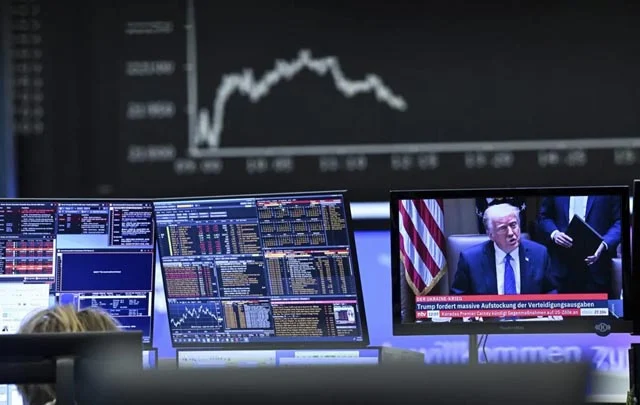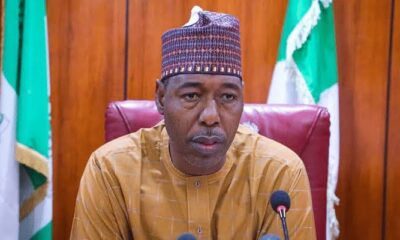Economy
Tariff hike: Telcos, ICT firms owe banks N1.69tn

Information, communication, and technology firms, including telecommunications companies in Nigeria, owed Deposit Money Banks N1.69tn as of September 2024 amid telcos’ calls for a hike in the tariff payable by subscribers for data and voice calls.
Figures obtained from the Central Bank of Nigeria’s quarterly statistical bulletin indicate that the indebtedness of the telcos and the other ICT firms represents a year-on-year decrease of N68.04bn, or 3.9 per cent, compared to the N1.77tn owed in September 2023.
The decline reflects the impact of the CBN’s repeated interest rate hikes, which has tightened monetary conditions and discouraged borrowing within the sector.
Month-on-month, however, there was a slight increase of N31.61bn, or 1.9 per cent, from the N1.66tn recorded in August 2024.
The year-on-year analysis shows that credit to the ICT sector experienced mixed trends throughout 2024.
In January, credit stood at N2.47tn, marking a significant increase of N1.23tn, or 99.3 per cent, compared to N1.24tn in January 2023.
However, by February, credit had declined to N2.35tn, though it still represented an 88.4 per cent increase year-on-year, with a difference of N1.10tn compared to February 2023.
By March, the pace of borrowing slowed further, with credit falling to N1.67tn. This represented a year-on-year increase of N385.24bn, or 30 per cent, compared to March 2023.
The trend continued into April, where credit remained relatively stable at N1.66tn, up N241.90bn, or 17 per cent, year-on-year.
In May, credit rose slightly to N1.68tn, reflecting an N308.38bn, or 22.4 per cent, an increase compared to the same period in 2023.
From June, year-on-year figures began to show a decline. Credit to the sector dropped to N1.64tn in June, representing a decrease of N81.59bn, or 4.7 per cent, compared to June 2023.
July saw a further decline to N1.69tn, down N48.93bn, or 2.8 per cent, from July 2023.
In August, the decline deepened, with credit falling to N1.67tn, a reduction of N107.37bn, or six per cent, compared to the N1.77tn recorded in August 2023.
By September, the year-on-year decrease of N68.04bn drew attention to the cautious borrowing stance adopted by firms in response to persistent economic uncertainties and high interest rates.
The decline in credit to the ICT sector throughout 2024 can be attributed to the CBN’s tight monetary policies, which have raised the cost of borrowing.
The apex bank has consistently hiked interest rates in a bid to curb inflation, with its monetary policy rate standing at a record high for most of the year.
CBN Governor Yemi Cardoso, who assumed office in September 2023, has overseen six interest rate hikes in 2024.
In February, the Monetary Policy Rate increased by 400 basis points, moving from 18.75 per cent to 22.75 per cent, the largest single hike of the year.
This was followed by another increase in March to 24.75 per cent. In May, the rate was raised again to 26.25 per cent, and by July, it reached 26.75 per cent.
The tightening cycle continued with an increase to 27.25 per cent in September, and the most recent hike in November brought the rate to 27.50 per cent.
These cumulative increases, totalling 875 basis points, are part of efforts to combat inflation and stabilise the economy.
This has had a direct impact on the borrowing capacity of firms, particularly those in capital-intensive sectors such as ICT.
Also, macroeconomic challenges, including exchange rate volatility and rising operational costs, have further constrained borrowing activity.
Despite these challenges, the ICT sector remains a critical driver of Nigeria’s economy, contributing significantly to Gross Domestic Product growth and employment.
Activities in the ICT sector contributed 16.35 per cent to Nigeria’s real GDP in Q3 2024, a decline from the 19.78 per cent it added in the previous quarter.
The National Bureau of Statistics disclosed this in the Q3 2024 GDP report.
The contribution was, however, higher than the 15.97 per cent contributed by the sector in the same period of last year.
According to the NBS, the ICT sector comprises the four activities of Telecommunications and Information Services: Publishing, Motion Picture, Sound Recording, and Music Production, as well as Broadcasting.
In the third quarter of 2024, the sector recorded a growth rate of 5.92 per cent in real terms, year-on-year.
This was driven largely by activities in the telecommunications sub-sector, which contributed 13.94 per cent to the GDP in the real term.
According to NBS, the telecom industry was the third-largest contributor to the real GDP in Q3 2024, coming behind only crop production and trade industries, contributing 26.51 per cent and 14.78 per cent, respectively.
The telecom industry, which is dominated by mobile network operators including MTN, Globacom, Airtel, 9mobile, and Internet Service Providers, is also driving a lot of activities in every other sector of the economy.
The closest sub-sector to telecoms in the ICT sector in terms of contribution was Broadcasting, which added 1.37 per cent.
The NBS data further revealed that the ICT sector contributed 11.30 per cent to the total Nominal GDP in the third quarter of 2024, lower than the rate of 11.57 per cent recorded in the same quarter of 2023 and lower than the 14.19 per cent it contributed in the preceding quarter.
In nominal terms, in the third quarter of 2024, the sector growth was recorded at 14.51 per cent (year-on-year), a 25.75 percentage points decrease from the rate of 40.27 per cent recorded in the same quarter of 2023 and 2.65 percentage points higher than the rate recorded in the preceding quarter.
Despite being a major contributor to the country’s GDP, the Nigerian telecommunications sector recorded an 87 per cent decline in foreign investments for the third quarter of 2024, marking a significant downtrend from the previous two quarters of the year.
The NBS data for capital importation showed that the sector attracted only $14.4m in capital importation in Q3, a sharp decline from the $113.42m investments recorded in Q2.
Year-on-year, the Q3 2024 capital importation for the telecom sector also represents a 77 per cent decline compared to the $64.05m recorded in the same period last year.
Despite the decline in the third quarter, the telecom sector has had better foreign investments this year than in previous years.
The NBS data showed that the sector attracted a $191.5m capital inflow in the first quarter of this year, marking a significant 769 per cent increase compared with $22.05m received in Q1 2023.
The investments recorded in the first quarter alone surpassed the total investments recorded by the sector in the full year 2023, which stood at $134.75m.
This came after years of consistent decline in investments, even with a gaping infrastructure gap requiring billions of investments to bridge.
In Q2 2024, FDIs in the sector stood at $113.4m. While this is lower than the inflow recorded in the preceding quarter, it represents a 339 per cent increase over the $25.81m capital inflow recorded in the same period last year.
Between January and September 2024, MTN Nigeria’s core capital expenditure dropped 27.79 per cent to N217.64bn, while Airtel’s capex fell 36.59 per cent to $149m.
This investment decline is tied to a N514.93bn loss between January and September 2024 for MTNN and a 46.9 per cent decline to $755m in Airtel Nigeria’s revenue in the period.
To adjust to these harsh economic realities, telcos renewed their push for tariff hikes this year.
According to the Association of Licensed Telecom Operators of Nigeria and the Association of Telecommunication Companies of Nigeria, telecom operators have advocated for higher prices for the last 11 years.
The telcos stressed the need for cost-reflective tariffs in the face of adverse economic headwinds like high inflation of 34.6 per cent in November 2024 and losses resulting from foreign exchange fluctuations.
However, telecommunications companies in Nigeria were mandated to increase their investments in network infrastructure following the approval of a tariff hike after 11 years of lobbying.
This follows an assertion by Bosun Tijani, the minister of communications, innovation, and digital economy, that tariff hikes will happen in the interests of the industry’s sustainability. “Tariff will go up,” he said.
The condition of this increase has been tied to a commitment by telcos to increase investments in the sector.
Economy
SEE Current Black Market Dollar (USD) To Naira (NGN) Exchange Rate

The exchange rate between the US dollar and the Nigerian naira continues to draw significant attention from individuals and businesses alike, especially those involved in international trade and remittances.
On Saturday, April 12, 2025, activity in the Lagos parallel market, commonly known as the black market shows that the buying rate for one US dollar stands at ₦1570, while the selling rate is ₦1575.
These figures are sourced from traders and Bureau De Change (BDC) operators who are active in key currency exchange hubs across Lagos.
Why the Black Market Rate Matters
Although the Central Bank of Nigeria (CBN) does not officially recognize or support the use of the black market for foreign exchange transactions, many Nigerians still rely on it due to difficulties in accessing forex through official banking channels. Issues such as limited availability, long processing times, and strict documentation requirements have made the black market a more accessible, albeit riskier, alternative.
CBN’s Official Position
The CBN continues to warn against participating in parallel market trading, stating that such activities undermine the stability of the national currency. The apex bank urges those in need of foreign currency to apply through authorized financial institutions, which are mandated to follow official exchange rates.
Nonetheless, the disparity between the official and unofficial markets persists, often influenced by market forces such as demand, inflation, and fluctuations in Nigeria’s foreign reserves.
Latest Exchange Rates Overview
Black Market (Parallel Market) Rate
Currency Pair Buying Rate Selling Rate
USD/NGN ₦1570 ₦1575
CBN Official Rate
Currency Pair Highest Rate Lowest Rate
USD/NGN ₦1630 ₦1570
Key Notes for Forex Users
The exchange rates in the black market often differ slightly from one location or dealer to another due to market volatility and negotiation margins.
Rates can also fluctuate within hours based on economic news, government policies, and global financial trends.
It is advisable to compare rates from multiple sources before conducting any large transactions, especially in volatile markets.
What This Means for Nigerians
The current forex rates reflect continued pressure on the naira, and many analysts believe that inflation, reduced oil revenue, and inconsistent monetary policies are key factors driving the demand for the dollar. For everyday Nigerians, this means the cost of imported goods remains high, and businesses dependent on international suppliers face growing challenges.
Until forex supply stabilizes through official channels, the black market will likely remain a major player in Nigeria’s currency landscape.
Economy
CHECK Exchange Rate As Naira Weakens More In Parallel Market

Naira has continued its downward slide in the parallel market on Thursday, exchanging at N1,621/$1, a depreciation from N1,580/$1 recorded just a day earlier on Wednesday.
This represents a N41 decline in 24 hours, deepening concerns among traders and economic watchers about sustained volatility in the FX market.
While the official exchange rate stood at N1,644.00/$1 on Wednesday, according to figures published on the Central Bank of Nigeria (CBN) website, there was no updated official rate published by the CBN several hours after the market close on Thursday.
Meanwhile, market participants at Wuse Zone 4 in Abuja attributed the persistent depreciation to a resurgence in speculative activities, unmet demand from importers, and lingering confidence issues in the foreign exchange market.
Alhaji Aminu Gwadabe, President of the Association of Bureau De Change Operators of Nigeria (ABCON), attributed the ongoing volatility in the forex market to a mix of local and global uncertainties. In a message sent to Nairametrics, he stated:
“The volatility, fears, happenings, and shocks in both the local and international markets called for disdain.
President Trump’s tariff announcements have sent markets into panic, loss of confidence, revenue losses, and budget reviews.”
He added that despite ongoing interventions by the CBN, instability persists.
“As usual, the CBN, being a catalytic actor, must continue to ensure stability through timely interventions. However, volatility remains a challenge and needs to be more comprehensively addressed,” Gwadabe said.
He further called for an expanded policy transmission mechanism to better serve the retail end of the FX market.
“It is therefore necessary for the CBN to reevaluate the efficacy of that Policy transmission mechanisms and expand its scope to the BDCs retail segment of the market to cater for the needs of the critical retail needs of invisible transactions where the BDCs pose the most potent tool of the CBN policy transmission mechanism.”
Dr. Muda Yusuf, CEO of the Centre for the Promotion of Private Enterprise (CPPE), also linked the naira’s recent struggles to global developments and speculative pressures.
“This is not unconnected to recent policy signals from President Trump and global oil price movements. The market is heavily information-driven, and speculative pressure has spiked following the tariff announcements,” Yusuf explained.
“Now that Trump appears to be having second thoughts, we might even see a bit of a breather in the FX market,” he added.
Meanwhile, traders on the ground say the situation is being worsened by the uncertainty surrounding ongoing government reforms and inconsistent access to official FX windows.
“The demand today was unusually high, especially from small businesses that can’t access the banks. It’s putting pressure on our supply,” a trader at Abuja’s Wuse Zone 4, who asked not to be named stated.
The spread between the official exchange rate of N1,644/$1 and the parallel market rate of N1,621/$1 narrowed slightly on Thursday, a sign that some convergence may be taking place, despite persistent volatility.
Market analysts warn that unless the CBN resumes consistent interventions or significantly boosts FX liquidity, the naira may continue to face downward pressure in the weeks ahead
The continued slide of the naira, despite heightened CBN interventions, signals persistent challenges in Nigeria’s FX liquidity and structural demand-supply mismatch.
Economy
Asian stocks jump as Trump postpones painful tariffs

Stocks rocketed Thursday as a relief rally spread through markets after Donald Trump paused crippling tariffs on US partners, with Chinese markets even brushing off his decision to ramp up duties on Beijing to 125 percent.
The across-the-board gains tracked a blistering performance on Wall Street as the US president said he would delay for 90 days measures announced last week that set off a firestorm on trading floors and sparked global recession fears.
Trump said he would keep in place a basic levy of 10 percent on dozens of countries but upped the ante in his brutal trade war with superpower rival China by hitting it even harder after it retaliated.
China’s own 84 percent retaliatory measures kicked in at 0401 GMT Thursday, later saying that US tariffs would “severely impact the stability of the global economic order”.
Trump made the decision because he said investors were “jumping a little bit out of line” as markets collapsed and US Treasuries — considered the safest option in times of crisis — were also showing signs of cracking on concerns about the world’s top economy.
People “were getting yippy, a little bit afraid”, he added, referring to a term in sports to describe a loss of nerves.
The extra tariffs on Beijing, however, were “based on the lack of respect that China has shown to the world’s markets”, Trump said.
The president denied he had made a U-turn, telling reporters that “you have to be flexible”.
And his top trade advisor, Peter Navarro, said, “This will go down in American history as the greatest trade negotiating day we have ever had.
“We’re in a beautiful position for the next 90 days, we’ve got over 75 countries that are going to come in and negotiate with us and what they’re going to have to do, without fail, is they’re going to have to lower their non-tariff barriers.”
Trump’s shock announcement on his Truth Social network sparked a buying frenzy as Asian and European investors chased beaten-down stocks.
“Asia markets are flipping the switch — from fear to euphoria — as Trump throws a 90-day lifeline, pausing the reciprocal tariff barrage,” said Stephen Innes at SPI Asset Management.
“The president’s post nodded to the ‘yippy’ reaction to his historic hikes, and honestly, that sums it up.
“We just witnessed one of the all-time bouncebacks — and now, we look for Asia investors, much like their North American counterparts, to step in and buy the ‘yips’.”
Hong Kong rallied more than two percent — a third day of gains after collapsing more than 13 percent on Monday in its worst day since 1997 during the Asian financial crisis. Shanghai gained more than one percent.
The two markets have been given extra support by optimism that China will unveil fresh stimulus to support its economy in light of the tariff measures. Official data showing another drop in consumer prices last month added to those hopes.
– ‘Fear to euphoria’ –
Tokyo’s Nikkei surged more than nine percent, while Taipei’s 9.3 percent gain was its best rise on record — after Monday’s 9.7 percent drop represented its worst fall.
Seoul, Singapore, Jakarta, Sydney, Saigon and Bangkok climbed between four and 6.6 percent. Manila and Wellington were also well in the positive territory.
London, Paris and Frankfurt soared at the open.
Tech firms were the standout performers, with Sony, Sharp, Panasonic and SoftBank chalking up double-digit gains, while airlines, car makers and casinos also enjoyed strong buying.
Apple suppliers posted strong rallies — Hong Kong-listed AAC Technologies surged 5.6 percent and in Taiwan, Hon Hai added almost 10 percent.
Gold surged almost three percent to around $3,120 — around $50 short of its record touched last month — thanks to the weaker dollar and as the uncertainty saw investors rush into the safe haven.
Chihiro Ota, at SMBC Nikko Securities, said: “What happens now? If the US takes a hardline stance (in negotiations), then the market would be disappointed. If it turns out that they can engage in talks, then it may create a room for (an upswing).”
US Treasury yields also edged down after a successful auction of $38 billion in notes, said Briefing.com.
That eased pressure on the bond market, which had fanned worries that investors were losing confidence in the United States.
However, observers warn that the China-US standoff could be another step towards a disengagement from the world’s top two economies.
“The escalation of the trade war between the US and China suggests that a full trade decoupling is increasingly likely,” said Mali Chivakul, emerging markets economist at J. Safra Sarasin bank.
“Even if we may see a de-escalation later, a decoupling could still be the result.”
Trump’s trade war is also causing a headache for the US Federal Reserve as it weighs whether to cut interest rates to protect the economy, or keep them elevated to ward off the inflation many say tariffs will fuel.
Minutes from its March meeting, released Wednesday, showed members felt they “may face difficult tradeoffs if inflation proved to be more persistent while the outlook for growth and employment weakened”.
Oil prices edged down after bouncing more than four percent Wednesday, though they remain under pressure amid concerns about the global economy and its impact on demand.
– Key figures around 0715 GMT –
Tokyo – Nikkei 225: 9.1 percent at 34,609.00 (close)
Hong Kong – Hang Seng Index: UP 2.7 percent at 20,804.08
Shanghai – Composite: UP 1.2 percent at 3,223.64 (close)
London – FTSE 100: UP 6.1 percent at 8,145.26
Dollar/yen: DOWN at 147.05 yen from 147.82 yen on Wednesday
Euro/dollar: UP at $1.0968 from $1.0948
Pound/dollar: UP at $1.2875 from $1.2810
Euro/pound: DOWN at 85.20 pence from 85.45 pence
West Texas Intermediate: DOWN 0.6 percent at $62.00 per barrel
Brent North Sea Crude: DOWN 0.7 percent at $65.04 per barrel
New York – Dow: UP 7.9 percent at 40,608.45 (close)
AFP
-

 News23 hours ago
News23 hours agoTinubu’s ugly past shores up as US Judge orders DEA, FBI to release files
-

 News11 hours ago
News11 hours agoAutonomy: 774 LGs challenge FG, states in court Tuesday
-

 Sports21 hours ago
Sports21 hours agoJust in: Newcastle pummel Man United 4-1
-

 News4 hours ago
News4 hours agoRivers women rally in support of state of emergency
-

 News21 hours ago
News21 hours ago2027: Atiku’s Opposition Front is a mission impossible-Wike declares
-

 News23 hours ago
News23 hours agoSAD! Another Christian Chukwu’s team mate, Charles Bassey is dead
-

 News11 hours ago
News11 hours agoZulum orders arrest, offers house, scholarship to abused boy in viral video
-

 News22 hours ago
News22 hours agoChristian Chukwu’s Death A Monumental Tragedy— Hon Nnaji
















